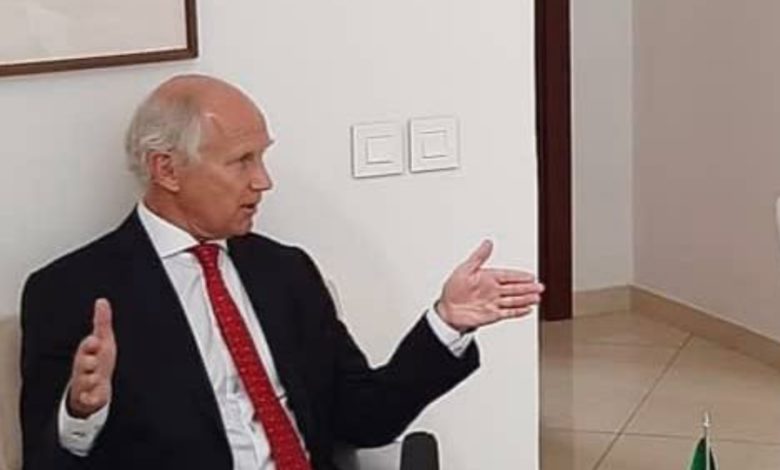New Methods Should Be Used In Combating Insecurity – Norwegian Ambassador

Ambassador of Norway to Nigeria, Mr. Jens-Petter Kjemprud has said that a new three method approach needs to be used in combating insecurity in the country.
According to Mr. Kjemprud, conflict cannot be fought using only force, but reconciliations and negotiations should also be sought as a means of alleviating insecurity.
Apart from this, he also mentioned that the security forces were greatly overstretched, with the insecurity situation rapidly spreading beyond the northeast, but into Katsina, Zamfara, Kaduna and even Sokoto, describing the situation as a serious war affecting the entire country.
The ambassador gave instances of terrorism, kidnapping and hijacking at sea as examples, which he described as “enormous problems.”
Speaking to HumAngle, the top diplomat said, “there is a multiplication of conflict in the country.
Two weeks ago, the army sent people to Southern Kaduna. Three weeks ago, more troops were sent to Katsina and Zamfara. The army and security forces are overstretched. It is a tremendous challenge.
“I also believe very strongly that you can’t fight conflict militarily. Of course, there is a need for an armed response, but there is also a need to reach out for reconciliation and negotiations.
“Addressing the background and real reasons for the conflict is key. Peace talks are needed,” he added.
Mr. Kjemprud also cited the alarming rate of poverty in the country as another contributing factor to criminality.
According to him, the World Bank had recorded a hundred million Nigerians live below the poverty line in the country.
“Insecurity is not a surprise with figures like these.”
With the current situation and economical problems coupled with the aftermath of the COVID-19 pandemic, the ambassador stated it would be difficult to alleviate this contributor of insecurity.
Mr. Kjemprud also attributed the Lake Chad region becoming a conflict hotspot as water is one of the main conflict drivers in the world, highlighting the similar case currently ongoing between Egypt and Ethiopia regarding the River Nile.
He also said that the agenda was made during the Oslo Humanitarian Conference in Nigeria and the Lake Chad Region, which took place in 2017, for an initiative to stabilize the Lake Chad region.
This included the joint governor’s forum from the regions in Nigeria, Niger and Cameroon, as well as international support groups, although efforts have been hindered due to the ongoing war.
Humanitarian support from Norway, is mostly targeted towards women and children.
“Humanitarian aid is to alleviate the problems of the population who are victims of conflict, so it doesn’t help to resolve the conflict, but only to help those suffering from it, that’s the purpose of humanitarian aid.
But we channel most of our assistance to the United Nations (UN) through the United Nations International Children’s Emergency Fund (UNICEF), UN Women and United Nations Population Fund (UNFPN).
These are three main organizations receiving assistance. We also support the Norwegian Refugee Council (NRC), who work with internal refugees,” Mr. Kjemprud said.
In 2019, 2,344 people benefitted from their education programme, 84,703 benefitted from their food security programme, and 44,816 benefitted from the shelter programme.
Support Our Journalism
There are millions of ordinary people affected by conflict in Africa whose stories are missing in the mainstream media. HumAngle is determined to tell those challenging and under-reported stories, hoping that the people impacted by these conflicts will find the safety and security they deserve.
To ensure that we continue to provide public service coverage, we have a small favour to ask you. We want you to be part of our journalistic endeavour by contributing a token to us.
Your donation will further promote a robust, free, and independent media.
Donate Here





The fact that there is serious conflict of confidence in some of the areas would make dialogue and negotiations more difficult. Government and security agencies need to build confidence in the affected communities for such non military alternatives to work.